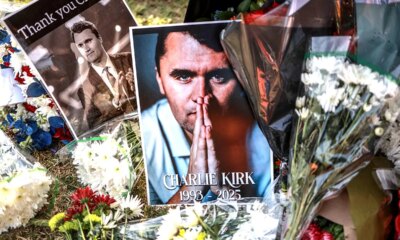Politics
There's a new reason your neighbors bought a weapon — gun culture 3.0

The rumors and conspiracy theories in Hurricane Helene’s wake came armed and dangerous: Government relief was a green light for property confiscation; funds had immediately run dry; the storm itself had been engineered by the government for the benefit of Kamala Harris’ campaign. Meterologists suffered death threats. In North Carolina, FEMA workers stopped knocking on doors out of fear that militia members were after them. In Tennessee, a church-group volunteer stood between federal helpers and angry open-carry gun-toting locals. And at least one arrest, of a man armed with a rifle and a handgun, took place in North Carolina.
The paranoia in hurricane country, with its undercurrent of violence, is just the latest sign of a new wrinkle in American gun ownership, something scholars have started describing as gun culture 3.0. The 1.0 version is firearm ownership based on hunting, often animated by a mythologized Western frontier. Gun culture 2.0 is self-defense-oriented, motivated by overwhelming concerns about violent crime that emerged in the 1960s. For years, gun-owning Americans have told pollsters that the No. 1 reason they own guns is to protect themselves in dangerous situations.
But that broad motivation conceals a shift in what many — though not all — gun owners feel they now need protection against. Borrowing from the militia movement, which identifies government tyranny as a key reason for firearms ownership, Gun culture 3.0 is all about perceived political threats unleashed by those no longer invested in normal guardrails — whether rogue government agents or rogue private individuals.
Of course, gun culture 3.0 raises the question of what will happen after Nov. 5. Regardless of what the American electorate does on election day, it’s hard to imagine a scenario that doesn’t enable violence.
In fact, it has already begun.
In Arizona, where I live, the Democratic Party office in Tempe was shot up three times over the last two months — and closed this month, its staff worn down by the threat of sprayed bullets. In Pima County, the Democratic office reset its public hours in light of incoming violent threats. Election workers scared for their lives are so common now, the change hardly made news.
Meanwhile, two assassination attempts against former President Trump almost feel unremarkable. Even the near-miss first attempt failed to register — one poll taken in the days after found that roughly 30% of Biden supporters (he was still in the race) downplayed the severity of the situation, suggesting that the attempt might have been staged. A similar slice of Republicans feel the same way about mass shootings.
Political violence and threats are looking like a feature, not a bug, of American politics.
Although gun owners are modestly more likely to believe that political violence is justified than their non-gun-owning counterparts, they are not more likely to express willingness to engage in such violence. Nevertheless, there is evidence that certain subgroups of gun owners may be. According to a recent study, 42% of assault-style-weapon owners say political violence could be justified, as did 56% of gun owners who carry all or most of the time.
Such attitudes betray right-wing distrust of government and a hard-line embrace of the 2nd Amendment. And yet, the same study reported that 44% of a different but potentially overlapping subgroup — new gun owners — also agreed that political violence could be justified. Disproportionately, new gun owners are women and people of color, and they tend to lean liberal as compared with existing gun owners. They too are part of an emergent gun culture 3.0.
In fact, a study published this summer in the American Journal of Preventive Medicine found that new gun owners are much more likely to be motivated by political concerns with regard to protective force than other issues: They want protection during rallies and demonstrations, and they are especially worried about violence from people who don’t share their political beliefs. Black gun owners — long-standing or new — in particular worried about police violence.
These data points suggest that Americans across the spectrum are turning to firearms as a tool of last resort to regain — as “bad feminist” and new gun owner Roxane Gay recently put it — “ways to not feel out of control.” And our divisive and distrustful politics are driving them there.
Some think political violence resolves itself, that it is its “own worst enemy,” because the backlash it causes renews people’s commitment to civility, and a fundamental, despite-our-differences unity. But waiting for political violence to shock Americans back from the brink can’t be the only way to stem the division and fear behind gun culture 3.0.
In Tennessee when armed antagonists approached aid workers in the aftermath of Hurricane Helene, the woman who stepped between them listened. “People just need to be heard,” she told a reporter, “I said, ‘I hear you.’ ” But she also pointed out what they could see for themselves: storm victims being helped, not exploited.
We can depolarize everyday life, calling out divisive behavior and labeling disinformation for what it is, even among our political allies, and working — no matter how hard it might be — to approach those on the “other side” with curiosity. Maybe even compassion.
Neither gun ownership nor gun limits will address the underlying fear and polarization that feeds gun culture 3.0. We have to address our withered capacity to live with one another.
Jennifer Carlson is the founding director of the Center for the Study of Guns in Society at Arizona State University and a 2022 MacArthur fellow.

Politics
Federal judge blocks Trump from cutting childcare funds to Democratic states over fraud concerns

NEWYou can now listen to Fox News articles!
A federal judge Friday temporarily blocked the Trump administration from stopping subsidies on childcare programs in five states, including Minnesota, amid allegations of fraud.
U.S. District Judge Arun Subramanian, a Biden appointee, didn’t rule on the legality of the funding freeze, but said the states had met the legal threshold to maintain the “status quo” on funding for at least two weeks while arguments continue.
On Tuesday, the U.S. Department of Health and Human Services (HHS) said it would withhold funds for programs in five Democratic states over fraud concerns.
The programs include the Child Care and Development Fund, the Temporary Assistance for Needy Families program, and the Social Services Block Grant, all of which help needy families.
USDA IMMEDIATELY SUSPENDS ALL FEDERAL FUNDING TO MINNESOTA AMID FRAUD INVESTIGATION
On Tuesday, the U.S. Department of Health and Human Services said it would withhold funds for programs in five Democratic states over fraud concerns. (AP Photo/Jose Luis Magana, File)
“Families who rely on childcare and family assistance programs deserve confidence that these resources are used lawfully and for their intended purpose,” HHS Deputy Secretary Jim O’Neill said in a statement on Tuesday.
The states, which include California, Colorado, Illinois, Minnesota and New York, argued in court filings that the federal government didn’t have the legal right to end the funds and that the new policy is creating “operational chaos” in the states.
U.S. District Judge Arun Subramanian at his nomination hearing in 2022. (Tom Williams/CQ-Roll Call, Inc via Getty Images)
In total, the states said they receive more than $10 billion in federal funding for the programs.
HHS said it had “reason to believe” that the programs were offering funds to people in the country illegally.
‘TIP OF THE ICEBERG’: SENATE REPUBLICANS PRESS GOV WALZ OVER MINNESOTA FRAUD SCANDAL
The table above shows the five states and their social safety net funding for various programs which are being withheld by the Trump administration over allegations of fraud. (AP Digital Embed)
New York Attorney General Letitia James, who is leading the lawsuit, called the ruling a “critical victory for families whose lives have been upended by this administration’s cruelty.”
New York Attorney General Letitia James, who is leading the lawsuit, called the ruling a “critical victory for families whose lives have been upended by this administration’s cruelty.” (Win McNamee/Getty Images)
CLICK HERE TO DOWNLOAD THE FOX NEWS APP
Fox News Digital has reached out to HHS for comment.
Politics
Washington National Opera is leaving the Kennedy Center in wake of Trump upset

In what might be the most decisive critique yet of President Trump’s remake of the Kennedy Center, the Washington National Opera’s board approved a resolution on Friday to leave the venue it has occupied since 1971.
“Today, the Washington National Opera announced its decision to seek an amicable early termination of its affiliation agreement with the Kennedy Center and resume operations as a fully independent nonprofit entity,” the company said in a statement to the Associated Press.
Roma Daravi, Kennedy Center’s vice president of public relations, described the relationship with Washington National Opera as “financially challenging.”
“After careful consideration, we have made the difficult decision to part ways with the WNO due to a financially challenging relationship,” Daravi said in a statement. “We believe this represents the best path forward for both organizations and enables us to make responsible choices that support the financial stability and long-term future of the Trump Kennedy Center.”
Kennedy Center President Ambassador Richard Grenell tweeted that the call was made by the Kennedy Center, writing that its leadership had “approached the Opera leadership last year with this idea and they began to be open to it.”
“Having an exclusive relationship has been extremely expensive and limiting in choice and variety,” Grenell wrote. “We have spent millions of dollars to support the Washington Opera’s exclusivity and yet they were still millions of dollars in the hole – and getting worse.”
WNO’s decision to vacate the Kennedy Center’s 2,364-seat Opera House comes amid a wave of artist cancellations that came after the venue’s board voted to rename the center the Donald J. Trump and the John F. Kennedy Memorial Center for the Performing Arts. New signage featuring Trump’s name went up on the building’s exterior just days after the vote while debate raged over whether an official name change could be made without congressional approval.
That same day, Rep. Joyce Beatty (D-Ohio) — an ex officio member of the board — wrote on social media that the vote was not unanimous and that she and others who might have voiced their dissent were muted on the call.
Grenell countered that ex officio members don’t get a vote.
Cancellations soon began to mount — as did Kennedy Center‘s rebukes against the artists who chose not to appear. Jazz drummer Chuck Redd pulled out of his annual Christmas Eve concert; jazz supergroup the Cookers nixed New Year’s Eve shows; New York-based Doug Varone and Dancers dropped out of April performances; and Grammy Award-winning banjo player Béla Fleck wrote on social media that he would no longer play at the venue in February.
WNO’s departure, however, represents a new level of artist defection. The company’s name is synonymous with the Kennedy Center and it has served as an artistic center of gravity for the complex since the building first opened.
Politics
AOC accuses Vance of believing ‘American people should be assassinated in the street’

NEWYou can now listen to Fox News articles!
Democratic Rep. Alexandria Ocasio-Cortez is leveling a stunning accusation at Vice President JD Vance amid the national furor over this week’s fatal shooting in Minnesota involving an ICE agent.
“I understand that Vice President Vance believes that shooting a young mother of three in the face three times is an acceptable America that he wants to live in, and I do not,” the four-term federal lawmaker from New York and progressive champion argued as she answered questions on Friday on Capitol Hill from Fox News and other news organizations.
Ocasio-Cortez spoke in the wake of Wednesday’s shooting death of 37-year-old Renee Nicole Good after she confronted ICE agents from inside her car in Minneapolis.
RENEE NICOLE GOOD PART OF ‘ICE WATCH’ GROUP, DHS SOURCES SAY
Members of law enforcement work the scene following a suspected shooting by an ICE agent during federal operations on January 7, 2026, in Minneapolis, Minnesota. (Stephen Maturen/Getty Images)
Video of the incident instantly went viral, and while Democrats have heavily criticized the shooting, the Trump administration is vocally defending the actions of the ICE agent.
HEAD HERE FOR LIVE FOX NEWS UPDATES ON THE ICE SHOOTING IN MINNESOTA
Vance, at a White House briefing on Thursday, charged that “this was an attack on federal law enforcement. This was an attack on law and order.”
“That woman was there to interfere with a legitimate law enforcement operation,” the vice president added. “The president stands with ICE, I stand with ICE, we stand with all of our law enforcement officers.”
And Vance claimed Good was “brainwashed” and suggested she was connected to a “broader, left-wing network.”
Federal sources told Fox News on Friday that Good, who was a mother of three, worked as a Minneapolis-based immigration activist serving as a member of “ICE Watch.”
CLICK HERE TO DOWNLOAD THE FOX NEWS APP
Ocasio-Cortez, in responding to Vance’s comments, said, “That is a fundamental difference between Vice President Vance and I. I do not believe that the American people should be assassinated in the street.”
But a spokesperson for the vice president, responding to Ocasio-Cortez’s accusation, told Fox News Digital, “On National Law Enforcement Appreciation Day, AOC made it clear she thinks that radical leftists should be able to mow down ICE officials in broad daylight. She should be ashamed of herself. The Vice President stands with ICE and the brave men and women of law enforcement, and so do the American people.”
-

 Detroit, MI7 days ago
Detroit, MI7 days ago2 hospitalized after shooting on Lodge Freeway in Detroit
-

 Technology4 days ago
Technology4 days agoPower bank feature creep is out of control
-

 Dallas, TX5 days ago
Dallas, TX5 days agoDefensive coordinator candidates who could improve Cowboys’ brutal secondary in 2026
-

 Dallas, TX2 days ago
Dallas, TX2 days agoAnti-ICE protest outside Dallas City Hall follows deadly shooting in Minneapolis
-

 Iowa4 days ago
Iowa4 days agoPat McAfee praises Audi Crooks, plays hype song for Iowa State star
-

 Health6 days ago
Health6 days agoViral New Year reset routine is helping people adopt healthier habits
-

 Nebraska3 days ago
Nebraska3 days agoOregon State LB transfer Dexter Foster commits to Nebraska
-

 Delaware1 day ago
Delaware1 day agoMERR responds to dead humpback whale washed up near Bethany Beach















